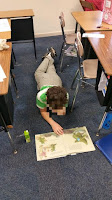I love teaching writing!
I don't hear many teachers saying this, so I know I'm in the minority here. I think I like teaching writing because I love to write. It's something that I've loved doing since I was in third grade. I remember writing a story about an elephant running away from the circus, and thinking that I wanted to write books when I grew up.
So here I am, teaching 5th graders how to write.
How? Through Writer's Workshop.
After going through some pretty intense training for Writer's Workshop when I taught at Tigerville Elementary School in SC, and then being a part of the Upstate Writing Project with Clemson, I'm a firm believer that Writer's Workshop works. It's not just another program that was thrown at me to figure out and implement immediately; it's a well-researched way to build a community of lifelong writers in your classroom.
 |
| Enjoying writing outdoors |
So, what is Writer's Workshop?
1. A time when students pretty much get to make choices about what they write.
2. Mini lessons
3. Time to write
4. Talking about our writing
5. Teachers modeling writing
6. Using Mentor Texts as examples
7. Sharing and celebrating the authors in all of us
It's my favorite time of the day (my students say the same thing)! And once you understand how it all works, I know you'll love it, too.
Check back with me every Wednesday for Writer's Workshop Wednesday. I plan on posting helpful tips and hints for being successful with this in your class. I promise each Writer's Workshop Wednesday post will have you excited to try something new with your students!
I'm giving away a couple customized Writing Process Clip Charts - leave a comment below about writing in your classroom (a moment of success or an area of frustration is fine). Make sure to leave your email address, too, so I can contact you! I'll choose the winners by Saturday, July 29.
Martha from "The Owl Spot"







